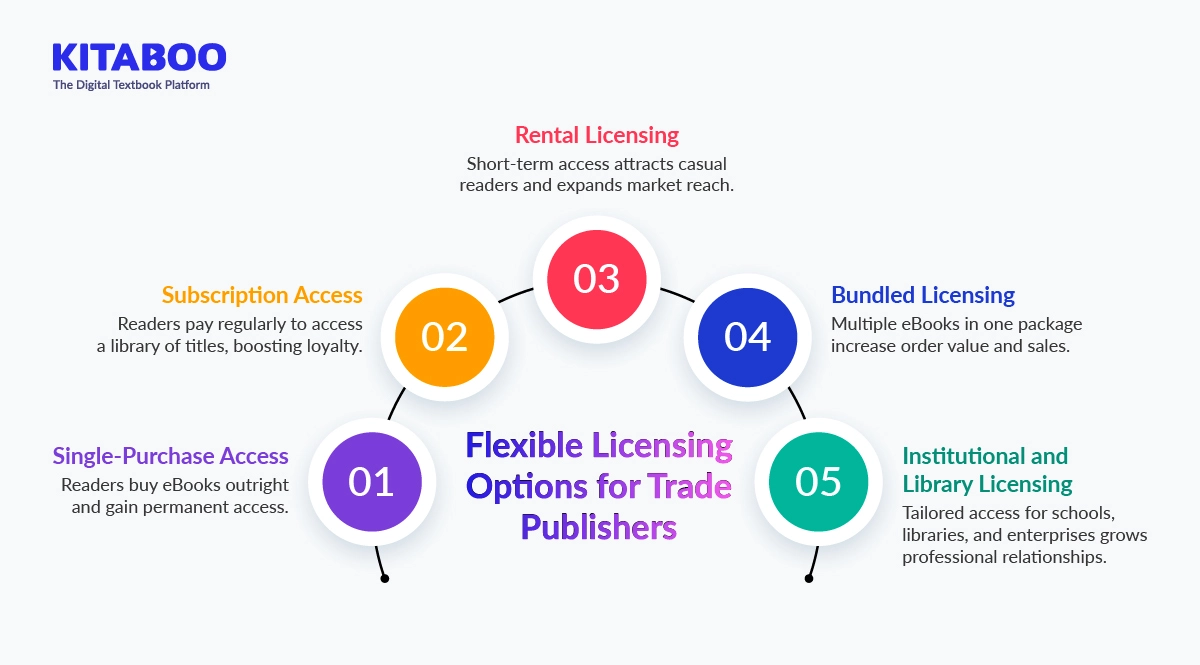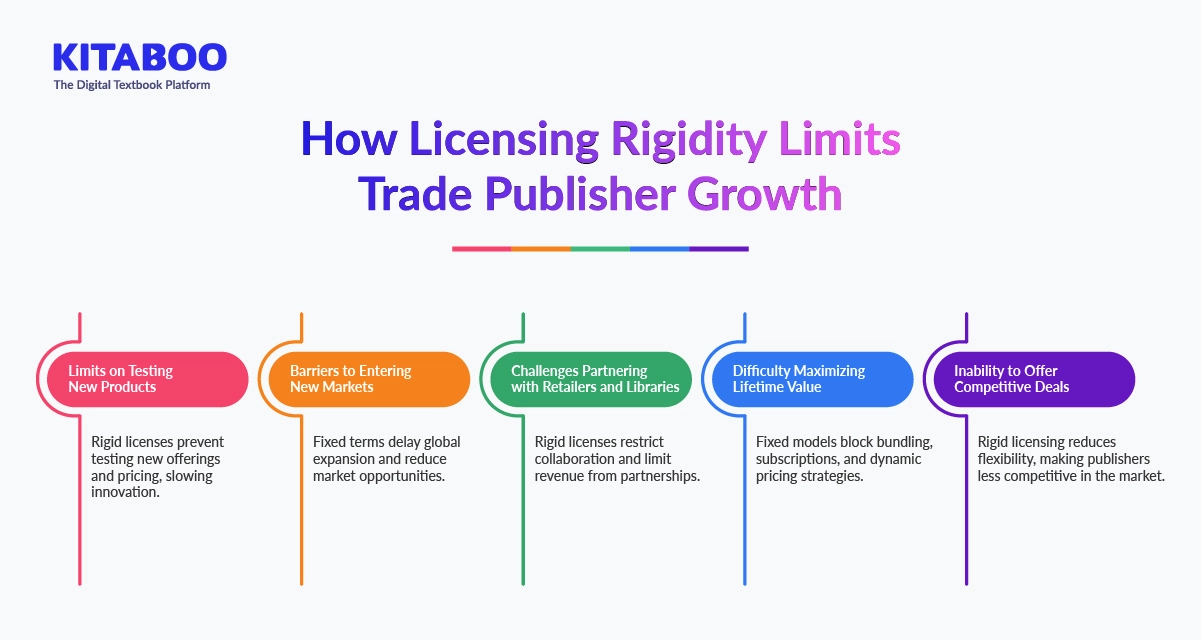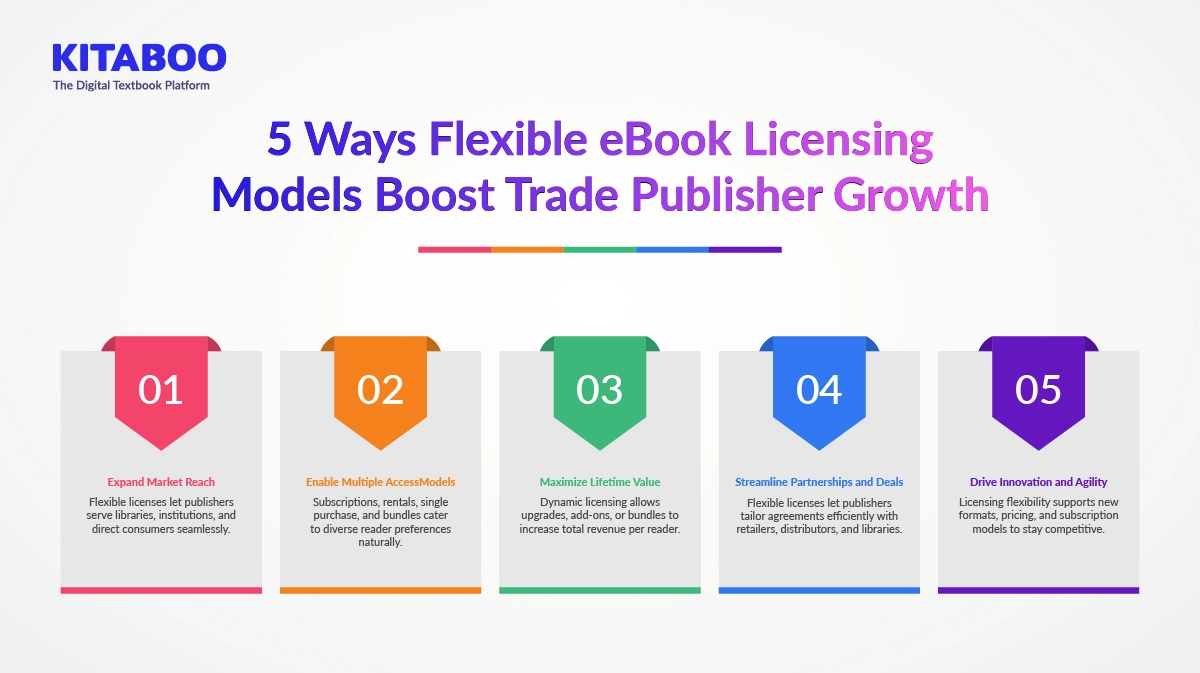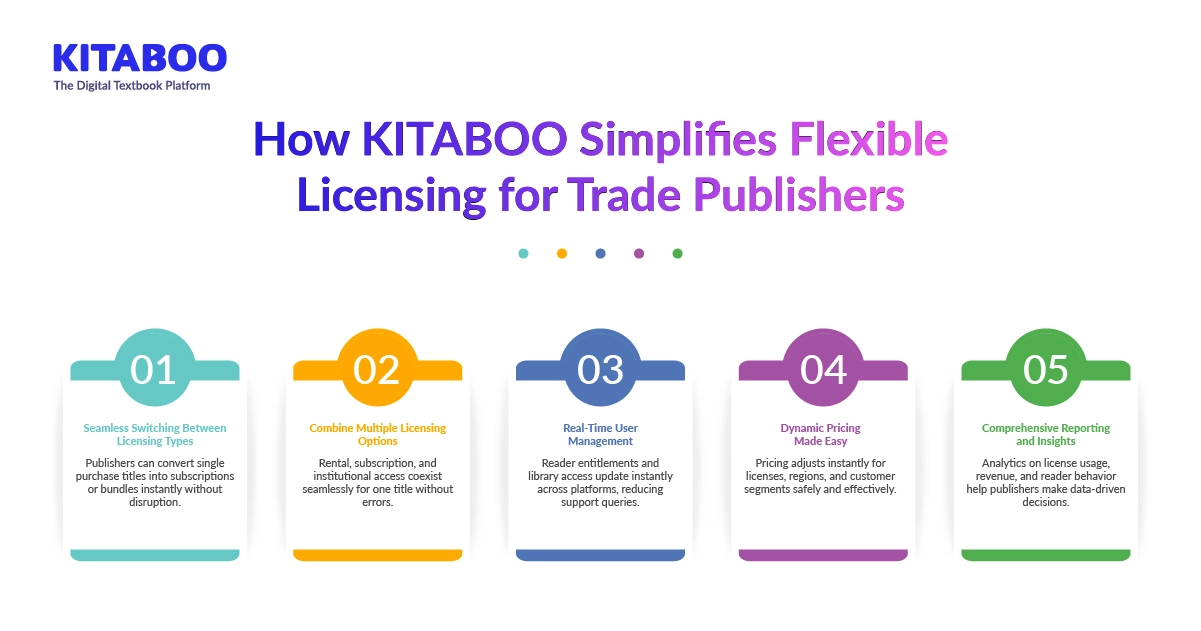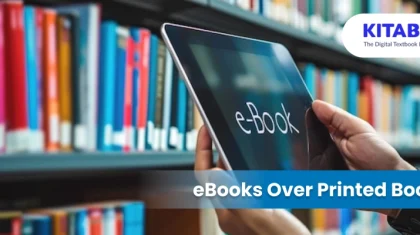
5 Ways Flexible Licensing Models Boost Publisher Growth
Summarize this blog with your favorite AI:
5 Ways Flexible Licensing Models Boost Publisher Growth – TL;DR
Flexible eBook licensing models allow trade publishers to offer single-purchase, subscription, rental, bundle, or institutional access. Traditional rigid licensing limits growth, slows market expansion, and reduces opportunities with retailers and libraries. Flexible licensing provides agility to meet diverse reader needs.
With flexible publisher licenses and subscription models in publishing, publishers can optimize revenue and scale globally. KITABOO enables easy switching, dynamic pricing, and real-time license management. It turns licensing into a growth engine while improving reader satisfaction and operational efficiency.
Here’s a quick overview for trade publishers:
| Key Concept | Takeaway |
|---|---|
| Flexible Licensing Options | Single-purchase, subscription, rental, bundle, and institutional access. |
| Challenges of Rigid Licensing | Limits market expansion, testing new products, and retailer/library partnerships. |
| Audience Targeting | Serve B2B, B2C, domestic, and international readers efficiently. |
| Revenue and Innovation | Dynamic pricing and new bundles boost revenue and experimentation. |
| Operational Efficiency | Automated license management and reporting reduce manual effort. |
| KITABOO Integration | Enables seamless switching, user management, and reporting for publishers. |
Are your eBook sales not matching the effort you put into growing your business? Many trade publishers feel limited by rigid licensing terms. You have audiences ready to buy, but outdated models restrict how content can be sold or shared. Each missed opportunity slows growth and makes it harder to stay competitive.
eBook licensing models built on flexibility change that reality. They open more paths to revenue and simplify how readers, retailers, and libraries access content. For trade publishers, this flexibility turns licensing from a limitation into a real growth driver.
Table of Contents
What Does Flexible Licensing Really Mean for Trade Publishers?
Flexible publisher licenses give publishers control over how readers access their eBooks. Instead of depending on one fixed sales model, they allow combining multiple options for different audiences.
This adaptability helps publishers test new markets, improve engagement, and scale efficiently. With eBook licensing models, publishers can turn every title into a strategic, revenue-generating opportunity.
1. Single-Purchase Access
This is the traditional model where readers buy an eBook outright. They own permanent access after purchase. It remains a reliable option for direct-to-consumer sales.
For publishers, it ensures upfront revenue and predictable sales cycles without extra effort. Single-purchase models are simple to implement and widely trusted by readers.
2. Subscription Access
In this model, readers pay regularly to access a library of titles. Subscription models in publishing build ongoing engagement and predictable revenue.
Publishers can launch curated collections or flexible tiers. This helps maintain reader loyalty and steady income flow. Subscription access encourages readers to explore more titles over time.
3. Rental Licensing
Rental models provide readers short-term access to content at a lower price. This attracts students and casual readers who prefer temporary access.
It also allows publishers to expand reach without devaluing permanent purchases. Content monetization strategies like rentals add flexibility and revenue diversity. Rentals can drive trial usage and introduce readers to new authors.
4. Bundled Licensing
Bundles group several eBooks into one package. Readers see more value, while publishers move multiple titles together. This strategy increases average order value and promotes backlist titles.
It strengthens brand recall and supports digital licensing growth through varied offerings. Bundles also encourage bulk purchases and improve overall sales velocity.
5. Institutional and Library Licensing
Libraries, schools, and enterprises need tailored licensing terms. It’s crucial to enable this flexibility with user-based access limits. It expands market reach into educational and corporate segments.
This model protects intellectual property while boosting institutional relationships and long-term growth. Institutional licensing also builds brand credibility in professional and academic markets.
Why Do Licensing Rigidities Hold Back Trade Publishers?
Many trade publishers struggle because traditional subscription models in publishing limit their flexibility. Rigid licensing blocks opportunities to experiment with pricing, reach new markets, or partner with libraries.
It creates delays in revenue recognition and adds operational stress. Without adaptable eBook licensing models, publishers cannot fully monetize content or respond to changing reader demands.
1. Limits on Testing New Products
Rigid licenses prevent publishers from experimenting with new offerings or pricing models. This slows down innovation and drastically reduces revenue potential.
Without flexibility, publishers cannot respond quickly to market trends or audience preferences. Flexible publisher licenses allow testing of new products without operational delays, keeping content competitive.
2. Barriers to Entering New Markets
Fixed licensing terms make global expansion slow and complicated. Navigating international rights and approvals consumes time and resources.
Trade publishers often miss emerging market opportunities while competitors act faster. Digital licensing growth is constrained because rigid models prevent adaptive strategies and local market customization.
3. Challenges Partnering with Retailers and Libraries
Rigid licenses limit collaboration options with libraries, institutions, and retailers. Tailored deals cannot be offered easily, reducing partnership opportunities.
Publishers miss revenue and audience growth while trying to maintain compliance. Effective flexible publisher licenses build scalable, profitable partnerships efficiently.
4. Difficulty Maximizing Lifetime Value
Fixed licensing restricts bundling, subscriptions, and dynamic pricing opportunities. Trade publishers cannot optimize revenue over a title’s lifecycle effectively. This can severely derail your content monetization strategies.
Without licensing flexibility, content remains under-monetized even if demand grows. eBook licensing models that allow multiple access types increase long-term value and boost profitability.
5. Inability to Offer Competitive Deals
Rigid licensing prevents trade publishers from tailoring terms for specific markets or clients. Competitors with flexible options secure deals faster and grow market share.
Without adaptable subscription models in publishing, publishers lose negotiating power. Their content monetization strategies take a hit as they cannot respond to changing customer expectations. On the contrary, flexible licensing models ensure agility and stronger competitiveness.
How Can Flexible eBook Licensing Models Drive Trade Publisher Growth?
Flexible licensing provides publishers the freedom to adapt offerings to diverse audiences. It allows targeting both B2B and B2C segments efficiently. Domestic and international markets can be served without extra complexity or delays.
Flexible licensing models become a strategic tool to unlocking new revenue streams. The flexibility powers growth, experimentation, and competitive advantage for trade publishers.
1. Expand Market Reach
Flexible licenses let publishers serve libraries, institutions, and direct consumers seamlessly. Titles can be adapted for local or global markets easily.
This approach accelerates digital licensing growth and opens new revenue channels. Trade publishers gain the ability to enter markets quickly while maintaining compliance and operational efficiency.
2. Enable Multiple Access Models
With flexible licensing, publishers can provide subscriptions, rentals, single-purchase, or bundled options to suit readers. These options cater to different preferences and budgets naturally.
Subscription models in publishing allow recurring revenue while one-time purchases ensure upfront returns. Flexible publisher licenses enable publishers to offer choice consistently, boosting engagement and reader satisfaction.
3. Maximize Lifetime Value
Dynamic licensing allows extensions, upgrades, or add-on content for existing readers. Publishers can offer bundles or new editions without delays or errors.
This increases total revenue per reader while maintaining satisfaction. Licensing models combined with flexible strategies enhance profitability and encourage repeat purchases naturally.
4. Streamline Partnerships and Deals
Flexible licenses allow publishers to tailor agreements with distributors, retailers, or libraries efficiently. Terms, pricing, and access levels can be adjusted without friction.
Flexible publisher licenses help in closing deals faster and scaling reach. Trade publishers gain stronger partnerships while reducing operational stress and delays.
5. Drive Innovation and Agility
Licensing flexibility allows experimentation with new formats, content bundles, pricing, and subscription models in publishing. Publishers can quickly respond to market trends without risking revenue.
Digital licensing growth is fueled by agile strategies that adapt to audience needs. Flexible eBook licensing models ensure publishers always remain competitive, innovative, and growth-focused.
How Does KITABOO Make Flexible Licensing Simple for Trade Publishers?
KITABOO enables trade publishers to switch and combine licensing types easily. Each order, subscription, or rental can be managed without manual intervention. eBook licensing models are applied instantly and consistently, reducing errors.
Reporting, dynamic pricing, and user management happen in real time. Flexible subscription models in publishing create a smooth, efficient system that supports revenue growth and operational ease for trade publishers.
1. Seamless Switching Between Licensing Types
Publishers can convert single-purchase titles into subscription or bundle offers instantly. Switching between licensing models doesn’t disrupt existing readers or sales workflows.
KITABOO ensures flexible publisher licenses are enforced accurately across all platforms. Trade publishers gain agility to meet market demands and reader expectations efficiently.
2. Combine Multiple Licensing Options
Multiple licenses like rental, subscription, and institutional access can coexist for one title. KITABOO manages overlapping access seamlessly without confusion or errors.
This flexibility strengthens content monetization strategies by offering readers and institutions tailored options. Publishers can expand offerings without extra technical overhead.
3. Real-Time User Management
KITABOO updates reader entitlements, library access, and subscriptions instantly. The user management changes reflect immediately across platforms, keeping user experience smooth and consistent.
The eBook licensing models are enforced automatically for every user, reducing support queries. Publishers can track usage and manage readers efficiently without delay.
4. Dynamic Pricing Made Easy
Pricing can be adjusted for different licenses, regions, or customer segments instantly. KITABOO supports promotional offers, bundles, and discounts without disrupting access.
This enhances digital licensing growth by optimizing revenue for each product. Trade publishers can experiment with pricing strategies safely and effectively.
5. Comprehensive Reporting and Insights
KITABOO provides detailed analytics for publishers on license usage, revenue, and reader behavior. Publishers can identify popular titles, optimize offerings, and refine strategies in real time.
Content monetization strategies become data-driven, enabling informed decision-making. Trade publishers gain clarity and control to scale operations confidently.
Conclusion
Trade publishers face constant pressure to deliver content quickly while maximizing revenue. Seamless licensing management and real-time access are essential for meeting diverse reader needs.
KITABOO enables effortless switching, dynamic pricing, and instant user management, removing operational bottlenecks.
This approach gives publishers agility and a strategic advantage while improving reader satisfaction. Book an exclusive demo today to see how flexible licensing can boost your revenue and streamline operations.
FAQs
Flexible eBook licensing models let publishers offer single-purchase, subscription, rental, bundle, or institutional access.
Rigid licensing restricts market expansion, experimentation, and partnerships with retailers or libraries.
It allows publishers to serve B2B, B2C, domestic, and international readers with tailored options.
Publishers can adapt pricing, offers, and access instantly, improving revenue and reader satisfaction.
It enables dynamic pricing, new bundles, and subscription models, driving growth and experimentation.
Yes, automated license management and real-time updates cut manual effort and errors.
KITABOO automates license switching, dynamic pricing, reporting, and user management for seamless operations.
Discover how a mobile-first training platform can help your organization.
KITABOO is a cloud-based platform to create, deliver & track mobile-first interactive training content.
